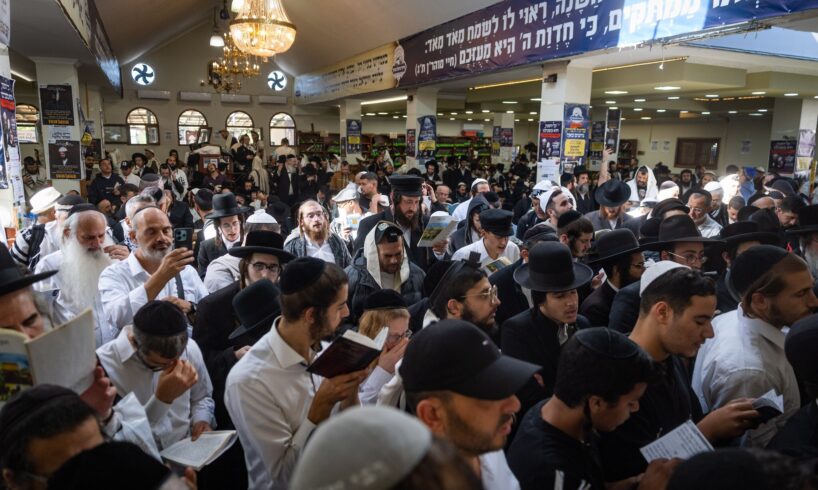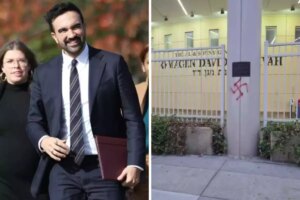
Despite a sharp spike in arrests of draft dodgers at Ben Gurion Airport and the difficulty of traveling to a country in the midst of a massive ground war, nearly 30,000 Israeli pilgrims have made their way to the small central Ukrainian city of Uman in recent days as part of an annual pilgrimage.
Every year, tens of thousands of Jews, mainly Hasidim, head to Uman from all around the world to visit the tomb of Rabbi Nachman of Bratslav (1772-1810) for Rosh Hashanah — the Jewish New Year — celebrated this year on September 23-24.
While the pilgrimage was largely halted in 2020 due to the worldwide COVID-19 pandemic, it restarted with a vengeance the following year and continued to grow, even in the face of the 2022 Russian invasion of Ukraine, which led Kyiv to close its airspace, forcing pilgrims to fly to neighboring countries such as Moldova and Poland, and then drive to Uman.
Speaking with The Times of Israel on Sunday, Ukrainian Ambassador Yevgen Korniychuk said that 28,000 pilgrims had already arrived in his country with more on the way, and that 40,000 may end up spending the holiday in Uman.
Aside from a massive increase in security, the Uman municipality’s pilgrimage-related expenses are not covered by the Ukrainian central government, which Korniychuk said is hard-pressed to provide additional police in the middle of a full-scale ground war.
Get The Times of Israel’s Daily Edition
by email and never miss our top stories
By signing up, you agree to the terms
This, he said, has led Kyiv to consider introducing a “pilgrimage visa” in the coming years, especially seeing that Jerusalem had offered neighboring Moldova millions of shekels just to facilitate the transit of pilgrims to Ukraine.
Uman Mayor Iryna Pletnyova did not respond to multiple request for comment.
Ukraine’s Ambassador to Israel Yevgen Korniychuk attends a ceremony marking the two years anniversary of the Russian invasion of Ukraine, in Tel Aviv, on February 23, 2023. (Erik Marmor/Flash90/File)
The logistics of pilgrimage
Prime Minister Benjamin Netanyahu’s government has itself reportedly dismissed the idea of charging outgoing pilgrims a fee to help pay for the expenses of securing their speedy transit through Ukraine’s neighbors. The suggestion had generated significant pushback among Israelis who were angry that their leaders would direct taxpayer funds toward a pilgrimage abroad — in particular for a sector that largely does not serve in the IDF — in the middle of Israel’s own two-year old war in Gaza.
According to media reports, the fee would have gone toward compensating Moldova for assisting with logistics for transiting Israelis, after Moldovan Prime Minister Dorin Recean had informed Netanyahu that Israel will need to cover the cost of logistics and security to assist Israelis who wish to travel through his country.
In response, Israel advanced a plan to give Moldova an estimated NIS 20 million ($5.3 million), NIS 8.7 million ($2.6 million) of which would be spent on the construction of a temporary terminal in Chișinău — with the rest going toward food, policing, and security, including a support team of 90 security guards during flights, 24 police officers and 50 translators.
Talks eventually broke down, however, and Moldova ended up declining to authorize additional flights from Israel.
Jewish visitors seen in the street of Uman, ahead of the Jewish holiday of Rosh Hashanah, September 30, 2024. (Chaim Goldberg/ Flash90/ File)
“There is no deal and no money,” a Moldovan government source told The Times of Israel. “There is no money, not 10 million, not 20 million. Nothing was transferred to Moldova and nothing will be transferred.”
But while Moldova did not receive any logistical help from Israel in the end, Ukraine did in the form of a small police delegation, similar to that provided by Jerusalem in previous years.
Speaking earlier this month, Korniychuk and National Security Minister Itamar Ben Gvir agreed on a plan that will see dozens of Israeli police officers and medics sent to Uman for the Rosh Hashanah holiday, according to the Ukrainian embassy in Israel.
According to the ambassador, Ben Gvir promised 15 uniformed officers as well as additional plainclothes police, totaling up to 100 personnel, although Ukraine was unable to secure portable bomb shelters or other requested equipment from Jerusalem.
Speaking with The Times of Israel, Israeli Ambassador to Kyiv Michael Brodsky said that 10 police officers had arrived in Ukraine and he was “not aware of any other investments.”
Neither Ben Gvir’s spokesman nor the Israel Police answered requests for comment.
Celebrating Rosh Hashanah behind bars
Over the past several weeks, the ultra-Orthodox Shas and United Torah Judaism parties have lobbied Netanyahu and military officials to allow draft-dodging yeshiva students to take part in the annual pilgrimage without fear of arrest, after the IDF started cracking down on Haredi draft evaders in recent months.
However, the Attorney General’s Office said that the government had no right to create a mechanism to let ultra-Orthodox draft dodgers leave Israel, writing a letter to the government late last month asserting that it would be illegal to allow draft evaders to leave Israel for Uman. Those evading conscription are prohibited from leaving the country.
Ultra-Orthodox Jews clash with police during a protest against the conscription of yeshiva students on Route 4 near Bnei Brak, September 11, 2025. (Avshalom Sassoni/Flash90)
This has led to a spike in arrests at the airport, with the extremist Jerusalem Faction group announcing on Sunday that around 100 Haredi draft dodgers were being held in military prison.
In a statement, the ultra-Orthodox group, which is vociferously opposed to the military enlistment of yeshiva students, said that over the last few days, dozens of evaders have been arrested and sent to prison, while some have since been released.
An expensive trip
For those who do make it to Uman, the pilgrimage often means crowded quarters and significant expenses as worshipers compete for a limited pool of rental apartments.
According to David Axelrod, an American-Israeli from Beit Shemesh who runs a hostel in Uman known as the “Uman Ranch,” pilgrims can be expected to pay between $600-1000 for a flight, $200-350 for bus rides and $300-700 for lodging.
All pilgrims are also required to pay a $27 fee to the Uman municipality itself in order to be allowed into the city.
Surprisingly, many of the worshipers paying these fees are not actually Hasidic or even ultra-Orthodox.
,This general view shows Hasidic Jewish pilgrims on a street next to the tomb of Rabbi Nachman of Breslov, ahead of Rosh Hashanah, in Uman, central Ukraine, on September 15, 2023, amid the Russian invasion of Ukraine. (Genya Savilov/AFP/File)According to the Israel Democracy Institute, around eight percent of all Jewish Israelis over age 18 have visited Uman. Of those who have visited, 23.5% are ultra-Orthodox, while 20% are national religious, 15% are traditional religious, 28% are traditional non-religious, and 13.5% are secular.
Among those who are Haredi, 21% of Sephardic Jews have reportedly visited Rebbe Nachman’s tomb at least once, compared to 15% among Hasidic Jews and 9% of so-called “Lithuanian” non-Hasidic Haredim.
Voters for the Sephardic Haredi Shas party (19%) are also more likely to have visited Uman than UTJ voters (13%), which represents both the Hasidic and Lithuanian communities.





